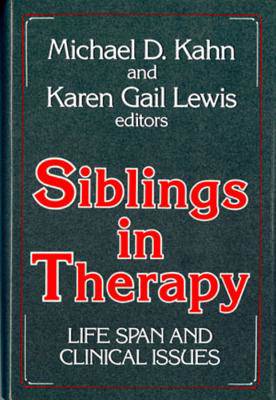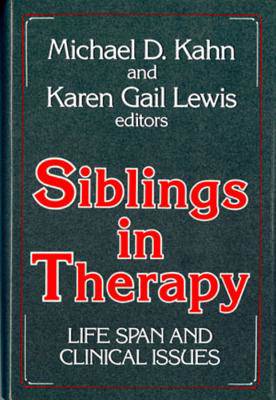
- Retrait gratuit dans votre magasin Club
- 7.000.000 titres dans notre catalogue
- Payer en toute sécurité
- Toujours un magasin près de chez vous
- Retrait gratuit dans votre magasin Club
- 7.000.0000 titres dans notre catalogue
- Payer en toute sécurité
- Toujours un magasin près de chez vous
Description
The first section covers Sibling Dynamics: General Issues: here contributors look at intense sibling relationships, effects of birth order and family structure, and ethnic issues.
Section II, entitled When Siblings Are Close: The Early Years, covers such issues as the sibling dynamics in large families, divorcing and remarried families, and alcoholic families, as well as treatment of brother-sister incest and with siblings of disabled children.
Moving into adolescence and young adulthood in Section III, Balancing Closeness and Separateness, clinicians share their experiences of working with symptoms as sibling messages, recognizing the special dynamics in families where the siblings are all of one gender, and supporting the sibling relationship in eating-disordered families and in families where one sibling has a chronic mental illness.
In Section IV, Settling Old Scores: The Middle Years, we are reminded that childhood siblings conflicts can haunt adult relationships. In addition, chapters examine sibling dynamics in family businesses and: sibling" issues among cotherapists and coauthors.
A sibling is often an individual's most enduring intimate contact, as the sibling relationship may last longer than those with parents, spouses, and children. Section V, Facing the Problems of Aging: The Late Years, explores relationships among adult siblings who care for their aged parents and among elderly siblings.
Spécifications
Parties prenantes
- Auteur(s) :
- Editeur:
Contenu
- Nombre de pages :
- 469
- Langue:
- Anglais
Caractéristiques
- EAN:
- 9780393700589
- Date de parution :
- 17-07-88
- Format:
- Livre relié
- Format numérique:
- Genaaid
- Dimensions :
- 162 mm x 240 mm
- Poids :
- 907 g

Les avis
Nous publions uniquement les avis qui respectent les conditions requises. Consultez nos conditions pour les avis.






